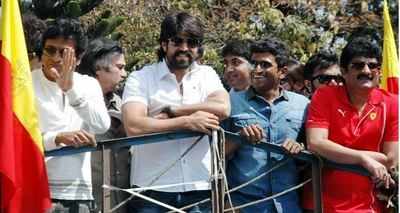- News
- entertainment
- kannada
- music
- Sandalwood loses no-dubbing battle?
Trending
This story is from June 6, 2015
Sandalwood loses no-dubbing battle?
Legal battle ends

The legal battle between supporters and opponents of dubbing entertainment content into Kannada has ended, or at least an important leg of it has. The Competition Commission of India (CCI), which was hearing the complaint since 2012, has completed its judgment on May 26. None of the parties have got the copy of the judgement yet, but the industry is sure it has lost.Three of the six organisations named in the complaint — Karnataka Television Association (KATA) and the directors' and the producers' associations — did not even manage to present their final arguments before the CCI.
Meanwhile, in a pre-emptive move, the complainant, Kannada Grahakara Koota and its president Ganesh Chetan, filed a caveat in the High Court of Karnataka against the Karnataka Film Chamber of Commerce (KFCC), Karnataka Television Association and the Karnataka Film Artistes, Workers and Technicians Union from obtaining any ex-parte stay on the CCI order.
According to sources close to the development, the gist of the CCI order is this: Industry bodies are wrong in preventing anyone from making and releasing dubbed films or television serials. The KFCC and KATA have been vocal in their opposition to dubbing and many film stars have taken to the streets in this regard. However, no party seems to have obtained the actual copy of the order and therein lies some leftover suspense. B Suresha of the KATA said, "We came to know about the CCI order from the caveat. We are awaiting the order. If the case has gone against us there is always the option of going on appeal in CCI itself."
About failing to present their case, Suresha said, "Our advocate had filed a leave application and sought time. If the order was passed on May 26, it means it was done ex-parte, without considering our arguments." KFCC president Thomas D'Souza said, "We do not have a copy of the CCI order. A caveat is only filed by the party which has won the case to protect their interests. Let us see what has happened."
In 2012, the CGK filed a complaint with the CCI that they were deprived of entertainment due to the monopoly of the KFCC, KATA and others who were preventing businesses from providing dubbed content. The CCI issued a 600-page notice to the organisations. In January 2013, the CCI's six-member committee refused interim relief. The KFCC managed to get a stay on the CCI proceedings from the HC. The HC sent back the case to CCI in November 2014.
This is not the first case related to dubbing that the CCI has decided upon. A few years ago, a private Bengali television channel challenged the ban on dubbed serials in Bengali and won the case. Bengali channels now telecast a large number of serials dubbed from Hindi.
Meanwhile, industry bodies elsewhere have the same gripe. In April, the Federation of Small Screen Technicians, Tamil Nadu, organised a strike against dubbed Hindi serials. In recent years, almost 50 per cent serials telecast on Tamil channels are dubbed from Hindi.
Meanwhile, in a pre-emptive move, the complainant, Kannada Grahakara Koota and its president Ganesh Chetan, filed a caveat in the High Court of Karnataka against the Karnataka Film Chamber of Commerce (KFCC), Karnataka Television Association and the Karnataka Film Artistes, Workers and Technicians Union from obtaining any ex-parte stay on the CCI order.
According to sources close to the development, the gist of the CCI order is this: Industry bodies are wrong in preventing anyone from making and releasing dubbed films or television serials. The KFCC and KATA have been vocal in their opposition to dubbing and many film stars have taken to the streets in this regard. However, no party seems to have obtained the actual copy of the order and therein lies some leftover suspense. B Suresha of the KATA said, "We came to know about the CCI order from the caveat. We are awaiting the order. If the case has gone against us there is always the option of going on appeal in CCI itself."
About failing to present their case, Suresha said, "Our advocate had filed a leave application and sought time. If the order was passed on May 26, it means it was done ex-parte, without considering our arguments." KFCC president Thomas D'Souza said, "We do not have a copy of the CCI order. A caveat is only filed by the party which has won the case to protect their interests. Let us see what has happened."
Dubbing from other languages into Kannada stopped in the 1960s following opposition from the film industry. The move was supported by the then community of Kannada writers who saw it as an erosion of local culture and talent. After the advent of television, serials too were not dubbed except for cartoons and para-dubbing of science, technology and other such programmes. But with private television channels arriving on the scene, demand for dubbed content was raised from time to time. A few Chennai and Mumbai-based Kannada television channels faced the wrath when they tried to telecast dubbed serials.
In 2012, the CGK filed a complaint with the CCI that they were deprived of entertainment due to the monopoly of the KFCC, KATA and others who were preventing businesses from providing dubbed content. The CCI issued a 600-page notice to the organisations. In January 2013, the CCI's six-member committee refused interim relief. The KFCC managed to get a stay on the CCI proceedings from the HC. The HC sent back the case to CCI in November 2014.
This is not the first case related to dubbing that the CCI has decided upon. A few years ago, a private Bengali television channel challenged the ban on dubbed serials in Bengali and won the case. Bengali channels now telecast a large number of serials dubbed from Hindi.
Meanwhile, industry bodies elsewhere have the same gripe. In April, the Federation of Small Screen Technicians, Tamil Nadu, organised a strike against dubbed Hindi serials. In recent years, almost 50 per cent serials telecast on Tamil channels are dubbed from Hindi.
End of Article
FOLLOW US ON SOCIAL MEDIA









